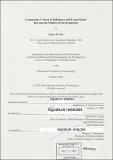Community unions in Baltimore and Long Island : beyond the politics of particularism
Author(s)
Fine, Janice (Janice Ruth)
DownloadFull printable version (116.6Mb)
Other Contributors
Massachusetts Institute of Technology. Department of Political Science.
Advisor
Richard M. Locke.
Terms of use
Metadata
Show full item recordAbstract
This dissertation explores newly emergent community-based organizations that are tackling work and wage issues at the local level and includes two lengthy case studies of the Workplace Project in Long Island and Solidarity in Baltimore. The thesis is built upon five interconnected claims. First, that into the breach left by the decline of the labor movement and political parties in late twentieth century America, a new type of labor market institution had emerged that was trying to fulfill the dual role of raising wage standards and giving political voice to low wage workers. Second, that the emergence of these community unions implied a break with the "work/home divide" thesis, which argued that in the United States historically, while class functioned as a constitutive category for workplace struggle, when it came to politics, it was trumped by other categories. On the contrary, I found that in community unions, class and ethnicity, class and race and class and gender march hand in hand, both at the workplace and in the community. Third, that in community unionism forms of identity, such as race, ethnicity and gender stand in for craft or industry and that this represents a third model, distinct from craft or industrial unionism. I argue that this third form was not just a recent phenomenon, but has been present throughout labor history and provide several historical examples including the United Farmworkers and 1199. Despite significant differences in origin, the Workplace Project and Solidarity ended up with a strikingly similar set of strengths and weaknesses. (cont.) They created dynamic organizations for constituencies who had no place else to turn to pursue work-related issues, but their numbers remain small by union standards and they have not been able to regularize membership through systematic collection of dues. Both organizations have had a very concrete impact on the way the media reports and the larger public perceive low wage workers and their issues.They have drafted, campaigned for and won important and imaginative new public policies. But neither organization has succeeded so far at large scale economic intervention or worker organizing. At present, they seem to be best at bringing community organizing strategies to bear on labor market issues through politics and worst at doing so through economic strategies.
Description
Thesis (Ph. D.)--Massachusetts Institute of Technology, Dept. of Political Science, 2003. Includes bibliographical references (p. [321]-334).
Date issued
2003Department
Massachusetts Institute of Technology. Department of Political SciencePublisher
Massachusetts Institute of Technology
Keywords
Political Science.